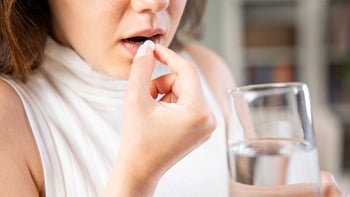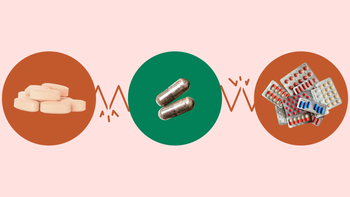
Does Vitamin D Give You Energy? Yes, and You Might Not Be Getting Enough
Key takeaways:
Vitamin D is known for its importance for bone health. But it also plays a role in inflammation, immune health, mental health, and energy production.
Low vitamin D levels have been linked with fatigue. Adding a vitamin D supplement to your diet may help improve your energy levels after a month.
You get vitamin D from sun exposure and certain foods — like milk, some fish, and mushrooms.
Table of contents

Vitamin D — also known as the sunshine vitamin — has long been known for how it helps you absorb calcium and maintain bone health. But newer research has expanded our understanding of its far-reaching effects. Vitamin D may also help prevent health issues like inflammation, depression, and heart disease. And it also plays a vital role in energy production and metabolism.
But vitamin D is also one of the four nutrients of public health concern. This means that many people in the U.S. aren’t getting enough of it. One symptom of low vitamin D can be low energy.
So, could low vitamin D be contributing to your afternoon slump? Here, we break down what we know so far on whether getting more vitamin D can help your energy levels.
Search and compare options
Can vitamin D improve your energy levels?
Yes, it seems that vitamin D can help improve your energy levels. Low vitamin D (vitamin D deficiency) is linked to fatigue. According to our current understanding, vitamin D helps with fatigue in several ways:
It lowers inflammation, which can cause fatigue.
It impacts neurotransmitters in the brain, like serotonin and dopamine. Both of these play a role in energy and mood.
So, if you’re not getting enough vitamin D, a supplement will likely help improve your energy levels.
This was found to be the case in two research studies. In both, researchers studied people who reported fatigue and also had low levels of vitamin D. And after they took vitamin D supplements for several weeks, they reported improved energy.
It’s not clear if taking vitamin D will help your energy, if your vitamin D levels are normal. But the current recommended amount of vitamin D to get per day is based on how much you need to help maintain bone mass. So, you may need more vitamin D than these amounts to help with energy.
Does taking vitamin D give you energy immediately?
No, a vitamin D supplement won’t give you an immediate burst of energy — not like a cup a coffee does.
Vitamin D2 vs. D3: Which form of vitamin D is better? We go through everything you need to know when choosing a supplement.
Are you low in vitamin D? Vitamin D deficiency might not be causing any noticeable symptoms. Here’s what you need to know about symptoms, testing, and treatment.
Vitamin D dosing: Learn more about choosing the right amount of vitamin D for you — and the dangers of getting too much.
But if you have vitamin D deficiency, you may find that your energy steadily increases after a month of taking a supplement regularly. In other words, taking vitamin D will likely have a longer-term impact on your energy levels instead of an immediate effect.
What are the best sources of vitamin D for energy?
Supplements are one way to get more vitamin D for energy. But there are natural ways too.
1. Sun exposure
Your skin makes vitamin D when it’s exposed to the sun. For people with lighter skin, less than 20 minutes of whole-body sun exposure can produce more than the recommended daily amounts. Research suggests that people with darker skin need a little more time — about 25 minutes in peak midday sun.
But you won’t get as much vitamin D from the sun if you:
Wear clothes that cover most of the body
Wear sunscreen
Live in a northern climate
Are older
Have darker skin
And don’t forget that the sun’s UV rays increase your risk of skin cancer. There’s no safe level of sun exposure when you’re trying to get vitamin D. So, instead of relying on sun exposure, you can add foods with vitamin D or try supplements.
2. Some foods
Vitamin D isn’t found as readily in foods and drinks as other nutrients are. Still, there are some foods high in vitamin D, such as:
Trout or salmon: 3 oz. contains 70% to 80% of your Daily Value of vitamin D
Mushrooms exposed to ultraviolet (UV) light: ½ cup contains 46% DV
Cow’s milk: 8 oz contains 15% DV
Some plant-based milks: 13% to 18% DV
It’s important to note that most yogurt, cheese, and other dairy products usually don’t have vitamin D added.
3. Supplements
People who have vitamin D deficiency — or those who are at higher risk for it — often have to take supplements. This can be helpful since there aren’t many foods high in vitamin D.
Vitamin D supplements come in two forms:
Vitamin D3 (animal source)
Vitamin D2 (plant source)
Both forms will raise your vitamin D levels. But vitamin D3 is slightly more effective. The biggest difference will come from the dose — not from the type. (More on dosage below.)
How much vitamin D should you take?
If you need a vitamin D supplement, the right dose depends on your:
Current vitamin D levels
Intake from food
Sun exposure
Risk for vitamin D deficiency
Other medical conditions
Healthy adults should get between 600 IU and 800 international units (IU) per day. This amount is geared toward bone health. But many people have low vitamin D levels. So there could be benefits to getting more of it.
For energy, you can aim to take between 1,000 IU and 2,000 IU of vitamin D per day. But it’s important to note that this is an off-label recommendation. The FDA hasn’t approved any dose of vitamin D for energy.
Too much vitamin D isn’t a good thing either. Higher doses can lead to vitamin D toxicity. The upper limit is 4,000 IU per day for people with normal vitamin D levels. Doses higher than this should be recommended and monitored by a healthcare professional.
The bottom line
There are many reasons you might be feeling low on energy. Not getting enough vitamin D might be one of them. It can be tough to get enough vitamin D from the sun or the foods you eat, so a supplement may help. Depending on your vitamin D levels, you may find taking a supplement that provides 1,000 IU to 2,000 IU per day may help. If you think you might be low on vitamin D — and energy — a good first step is to see a healthcare professional.
Why trust our experts?


References
American Academy of Dermatology Association. (2025). Vitamin D.
Asif, A., et al. (2023). Vitamin D toxicity. StatPearls.
Bleizgys, A. (2021). Vitamin D dosing: Basic principles and a brief algorithm (2021 update). Nutrients.
Dietary Guidelines for Americans. (n.d.). Food sources of select nutrients. U.S. Department of Agriculture.
Molfetta, I. V. D., et al. (2024). Vitamin D and its role on the fatigue mitigation: A narrative review. Nutrients.
Nowak, A., et al. (2016). Effect of vitamin D3 on self-perceived fatigue: A double-blind randomized placebo-controlled trial. Medicine.
Office of Dietary Supplements. (2024). Vitamin D: Fact sheet for health professionals. National Institutes of Health.
Roy, S., et al. (2014). Correction of low vitamin D improves fatigue: Effect of correction of low vitamin D in fatigue study (EViDiF study). North American Journal of Medical Sciences.

























